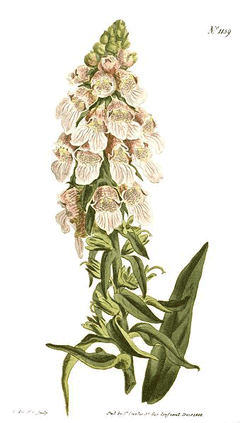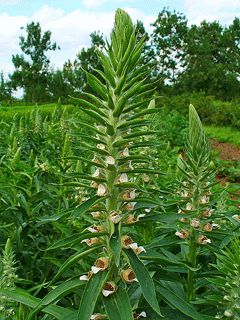 |
|
http://commons.wikimedia.org/wiki/File:Digitalis_lanata.jpg |
 |
| http://commons.wikimedia.org/wiki/User:Llez |
Translate this page:
Summary
Physical Characteristics

 Digitalis lanata is an evergreen Biennial/Perennial growing to 0.6 m (2ft) by 0.3 m (1ft in). It is in leaf all year, in flower from June to July, and the seeds ripen in September. The species is hermaphrodite (has both male and female organs) and is pollinated by Bees.
Digitalis lanata is an evergreen Biennial/Perennial growing to 0.6 m (2ft) by 0.3 m (1ft in). It is in leaf all year, in flower from June to July, and the seeds ripen in September. The species is hermaphrodite (has both male and female organs) and is pollinated by Bees.
Suitable for: light (sandy), medium (loamy) and heavy (clay) soils. Suitable pH: mildly acid, neutral and basic (mildly alkaline) soils. It can grow in semi-shade (light woodland) or no shade. It prefers dry or moist soil.
UK Hardiness Map
US Hardiness Map
Synonyms
Digitalis epiglottidea. Digitalis orientalis. Digitalis winterli .
Plant Habitats
Woodland Garden Dappled Shade; Shady Edge;
Edible Uses
References More on Edible Uses
Medicinal Uses
Plants For A Future can not take any responsibility for any adverse effects from the use of plants. Always seek advice from a professional before using a plant medicinally.
Cardiac Stimulant Tonic
The Grecian foxglove is a widely used herbal medicine with a recognised stimulatory effect upon the heart. It is also used in allopathic medicine as the main source of the cardiac glycosides that are used in the treatment of heart complaints[238, 254]. It has a profound tonic effect upon a diseased heart, enabling the heart to beat more slowly, powerfully and regularly without requiring more oxygen[254]. At the same time it stimulates the flow of urine which lowers the volume of the blood and lessens the load on the heart[254]. The plant contains cardiac glycosides (including digoxin, digitoxin and lanatosides). Digitoxin rapidly strengthens the heartbeat but is excreted very slowly. Digoxin is therefore preferred as a long-term medication[254]. The leaves are cardiac, diuretic, stimulant and tonic[4, 9, 21, 46, 171]. The leaves should only be harvested from plants in their second year of growth, picked when the flowering spike has grown and about two thirds of the flowers have opened[4]. Harvested at other times, there is less of the medically active alkaloid present[4]. The seed has also been used in the past[4]. The leaves also have a very beneficial effect on the kidneys, they are strongly diuretic and are used with benefit in the treatment of dropsy[4]. Great care should be exercised in the use of this plant, the therapeutic dose is very close to the lethal dose[222]. Their use should always be supervised by a qualified practitioner since in excess they cause nausea, vomiting, slow pulse, visual disturbance, anorexia and fainting[238]. See also the notes above on toxicity. A homeopathic remedy is made from the leaves[9]. It is used in the treatment of cardiac disorders[9]. Digitalis lanata has three times the physiological effects of Digitalis purpurea and in now preferred due to the quick onset of effects [301].
References More on Medicinal Uses
The Bookshop: Edible Plant Books
Our Latest books on Perennial Plants For Food Forests and Permaculture Gardens in paperback or digital formats.

Edible Tropical Plants
Food Forest Plants for Hotter Conditions: 250+ Plants For Tropical Food Forests & Permaculture Gardens.
More

Edible Temperate Plants
Plants for Your Food Forest: 500 Plants for Temperate Food Forests & Permaculture Gardens.
More

More Books
PFAF have eight books available in paperback and digital formats. Browse the shop for more information.
Shop Now
Other Uses
References More on Other Uses
Cultivation details
An easily grown plant, succeeding in ordinary garden soil, especially if it is rich in organic matter[1]. It prefers a neutral to acid soil[238] and also succeeds in dry soils and, once established, is drought tolerant[188, 190]. It prefers semi-shade but succeeds in full sun if the soil is moist[188, 200]. The Grecian foxglove is cultivated for the medicinally active glycosides that are contained in the leaves[238]. This species is preferred over D. purpurea as a source of glycosides for the pharmaceutical industry[238]. Plants are either biennial or short-lived perennials[238]. Members of this genus are rarely if ever troubled by browsing deer or rabbits[233]. This species can develop crown rot and root rot when growing in damp conditions[238].
References Carbon Farming Information and Carbon Sequestration Information
Temperature Converter
Type a value in the Celsius field to convert the value to Fahrenheit:
Fahrenheit:
The PFAF Bookshop
Plants For A Future have a number of books available in paperback and digital form. Book titles include Edible Plants, Edible Perennials, Edible Trees,Edible Shrubs, Woodland Gardening, and Temperate Food Forest Plants. Our new book is Food Forest Plants For Hotter Conditions (Tropical and Sub-Tropical).
Shop Now
Plant Propagation
Seed - surface sow early spring in a cold frame. The seed usually germinates in 2 - 4 weeks at 20°c[175]. When they are large enough to handle, prick the seedlings out into individual pots and plant them out in the summer.
Other Names
If available other names are mentioned here
Native Range
TEMPERATE ASIA: Turkey EUROPE: Austria, Czech Republic, Hungary, Slovakia, Moldova, Albania, Bulgaria, Greece, Croatia, Romania, Serbia
Weed Potential
Right plant wrong place. We are currently updating this section.
Please note that a plant may be invasive in one area but may not in your area so it's worth checking.
Conservation Status
IUCN Red List of Threatened Plants Status :

Growth: S = slow M = medium F = fast. Soil: L = light (sandy) M = medium H = heavy (clay). pH: A = acid N = neutral B = basic (alkaline). Shade: F = full shade S = semi-shade N = no shade. Moisture: D = dry M = Moist We = wet Wa = water.
Now available:
Food Forest Plants for Mediterranean Conditions
350+ Perennial Plants For Mediterranean and Drier Food Forests and Permaculture Gardens.
[Paperback and eBook]
This is the third in Plants For A Future's series of plant guides for food forests tailored to
specific climate zones. Following volumes on temperate and tropical ecosystems, this book focuses
on species suited to Mediterranean conditions—regions with hot, dry summers and cool, wet winters,
often facing the added challenge of climate change.
Read More
Expert comment
Author
Ehrh.
Botanical References
50200
Links / References
For a list of references used on this page please go here
Readers comment